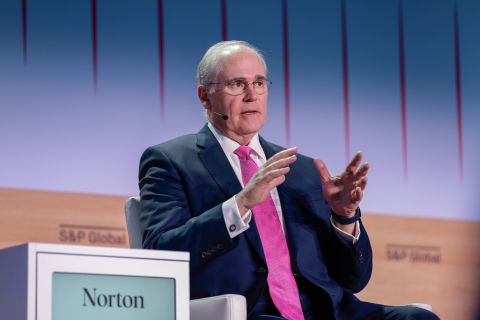There is no fundamental energy shortage, BP chief executive officer John Browne maintains. Global energy markets are better described as being in the midst of "testing times," he says. Speaking as the London multinational released its "2001 Statistical Review of World Energy," Browne and BP chief economist Peter Davies said markets are working, and to some degree, the oil-market cycle already has turned. Worldwide proved oil reserves increased from 660 billion barrels in 1980 to 1.05 trillion barrels in 2000. World oil production of 65 million barrels per day in 1980 grew to 75 million in 2000. World oil consumption in 1980 roughly equaled production. In 2000, consumption trailed production by 1 million barrels per day. Worldwide proved gas reserves were 5,304 trillion cubic feet (Tcf), or 61 years of supply at the current rates of production. In the U.S., the picture is quite different: proved gas reserves have declined during the last 20 years and now stand at 167 Tcf, just shy of nine years of supply. World oil consumption rose by just 1%-600,000 barrels per day in 2000-while world oil supply grew four times as fast, BP calculates. How could oil prices rise so far? "The answer lies in inventory behavior," says the company's statistical review. In 1999, the world market rebalanced after a year of excess supply, high inventories and low prices. The rebalancing came as production fell sharply below consumption. In 2000, the world required higher production, about 1.1 million barrels per day to stop the inventory decline; 600,000 barrels per day to supply the higher demand; and a further amount to rebuild stocks to desired or normal levels-probably at least another 1 million barrels per day. All of this totaled 2.7 million barrels per day. World oil inventories still ended the year below normal levels, and this kept prices high. "Behind all this, oil markets have been responding to market forces, even though full market adjustments take a long time, often three to five years," BP says. The oil-market cycle already has turned to some degree, it adds. "World oil capacity is now rising faster than world oil consumption. This situation is expected to continue and to raise global spare capacity until the next cyclical downturn." Browne says, "It is very clear from the data that what we've experienced is a series of market responses to particular circumstances and patterns of regulation. Energy demand has increased, but there is no physical shortage of oil and gas."
Recommended Reading
Hess: Pre-emption Provision Doesn't Apply to Buyout Deal With Chevron
2024-02-27 - Hess Corp. said on Feb. 27 that a pre-emption provision does not apply to its proposed $53-billion buyout by Chevron Corp. and it remains "fully committed" to the deal.
EQT, Equitrans Midstream to Combine in $5.5B Deal: Reports
2024-03-11 - EQT Corp.'s deal would reunite the natural gas E&P with Equitrans Midstream after the two companies separated in 2018.
Ithaca Energy to Buy Eni's UK Assets in $938MM North Sea Deal
2024-04-23 - Eni, one of Italy's biggest energy companies, will transfer its U.K. business in exchange for 38.5% of Ithaca's share capital, while the existing Ithaca Energy shareholders will own the remaining 61.5% of the combined group.
ONEOK CEO: ‘Huge Competitive Advantage’ to Upping Permian NGL Capacity
2024-03-27 - ONEOK is getting deeper into refined products and adding new crude pipelines through an $18.8 billion acquisition of Magellan Midstream. But the Tulsa company aims to capitalize on NGL output growth with expansion projects in the Permian and Rockies.
SCF Acquires Flowchem, Val-Tex and Sealweld
2024-03-04 - Flowchem, Val-Tex and Sealweld were formerly part of Entegris Inc.


